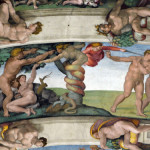We run our website the way we wished the whole internet worked: we provide high quality original content with no ads. We are funded solely by your direct support. Please consider supporting this project.
If every effect has a cause, how can there be free choice?
The most common argument given in defense of determinism is that it’s implied in the nature of causation. Every event has a cause, and this cause accounts for the event being the way it is. This cause must itself have had a cause that accounts for it, and so on ad infinitum. Hence, everything must have been predetermined from the beginning (if there was a beginning), and so there is no room for freedom or spontaneity.
Now, I don’t think anyone can dispute the claim that every contingent event must have a cause. The idea of a completely uncaused contingent event is absurd. (Notice, I say every contingent event must have a cause, since I see nothing unintelligible in the concept of a necessary being, such as God, being uncaused. That’s what it means to be necessary, in contrast to being contingent). What is disputable, however, is the claim that every cause necessitates one, and only one, effect.
It’s one thing to say, (a) “ X is the cause of Y,” and another thing to say that (b) “Given X, Y had to happen” and/or (c) “Given X, only Y could happen.” There is no good reason to assume (b) and (c) are universally true. This is nothing more than a philosophical dogma. It is, in fact, the dogma of determinism.
The fact is that, as David Hume argued centuries ago, we don’t even know what a “cause” is. It is simply a word we use to say “When we observe X, we observe Y after it.” But there’s nothing in the nature of causation itself that says Y must always follow X. So there’s no basis for the assumption that “Given X, Y had to happen, and only Y could happen.”
If we look at the world as a work of art instead of a deterministic mechanism – as western science up until recently has been imagining it – we can see this more clearly. Imagine that we are all artists invited to paint a segment of a grand mosaic, and we paint with our free decisions. Now let’s think about causation in this context.
Imagine Van Gogh’s famous hallucinogenic painting, “Starry Night.” We’d all agree that every riveting detail of this work is explainable by referencing the aesthetic vision that was inspiring Van Gogh to paint this painting. Nothing in the painting is capricious (that is, without a cause). Yet, can’t we imagine a slightly different painting being explainable by referencing this same aesthetic vision?
If the church steeple in the painting had been a centimeter taller or shorter, for example, would it alter the aesthetic achievement of the painting? If it had been a centimeter to the left or right, would it have been inconsistent with the vision that was behind this painting? If one particular stroke of yellow or purple or black had been a centimeter longer or shorter, couldn’t we explain it by appealing to the same aesthetic vision we would appeal to now to explain the shades that are presently in the painting? And so for a trillion other details in this painting.
My point is that a given cause can explain more effects than one, as artist works illustrate. But our own free decisions reveal this as well. So do quantum particles. And so does every aspect of creation! There’s causation everywhere, but there’s also an element (however slight) of spontaneity everywhere.
This dance of order and freedom, structure and spontaneity, is what makes the creation beautiful and an adventure.
So, determinism rests on an unwarranted assumption about causation. It runs against our experience of free decision making, of creating works of art and many other things. And it’s inconsistent with some recent advances in science (as my forthcoming book The Cosmic Dance will attempt to prove). Every effect does have a cause, but its not that case that given that cause, the effect had to follow.
Category: General
Tags: Free Will, Predestination
Related Reading

The Earth is a Spiritual Battlefield
The early Church Fathers uniformly believed that angels, like humans, were created free and given a sphere of influence and responsibility over creation. As with humans, angels could use this influence for good, as God intended, or they could choose to use it for evil. They understood that this is simply what it means for…

Sinful Nature and Free Will
Q: If our sinful nature is what causes us to sin/reject God, can we be held responsible for our sins, when this nature resulted from Adam and Eve’s sin? Do we really have the freedom to either choose/reject God if our sinful nature compels us to reject God? On the other hand, if our sinful…

The Open View and Predestination
Paul wrote in Ephesians, “For he [God] chose us in him before the creation of the world to be holy and blameless in his sight. In love he predestined us for adoption to sonship through Jesus Christ …” (Eph 1:3-4). Some argue that the particular way Scripture portrays God’s providential plan is incompatible with the…

What is the biblical basis for “free will”?
Question: Much of your theology depends on a supposed ability humans have to thwart God’s will by our free choices. But what is the biblical basis for your conclusion that people have “freedom”—at least “freedom” in the sense that we can decide to go along with or thwart God’s will for our lives? Answer: Scripture…

God Does Not Always Get What He Wants
One of the ways the Bible makes it clear that humans have free will and that God doesn’t predetermine human decisions is found in the responses God has toward human choices. Scripture consistently depicts God as being frustrated by the way his people obstinately resist his plans and Scripture often depicts God’s heart as breaking…

What To Do with the Bible’s Talk of Satan
Recently, Roger Olson raised the question on his blog about why Satan is ignored in modern theology. He observed how Greg’s theology takes an “obvious, ‘up front,’ blatant belief in a very personal, very real, very active Satan who has great power in the world.” Because we often have so little to say about Satan…
